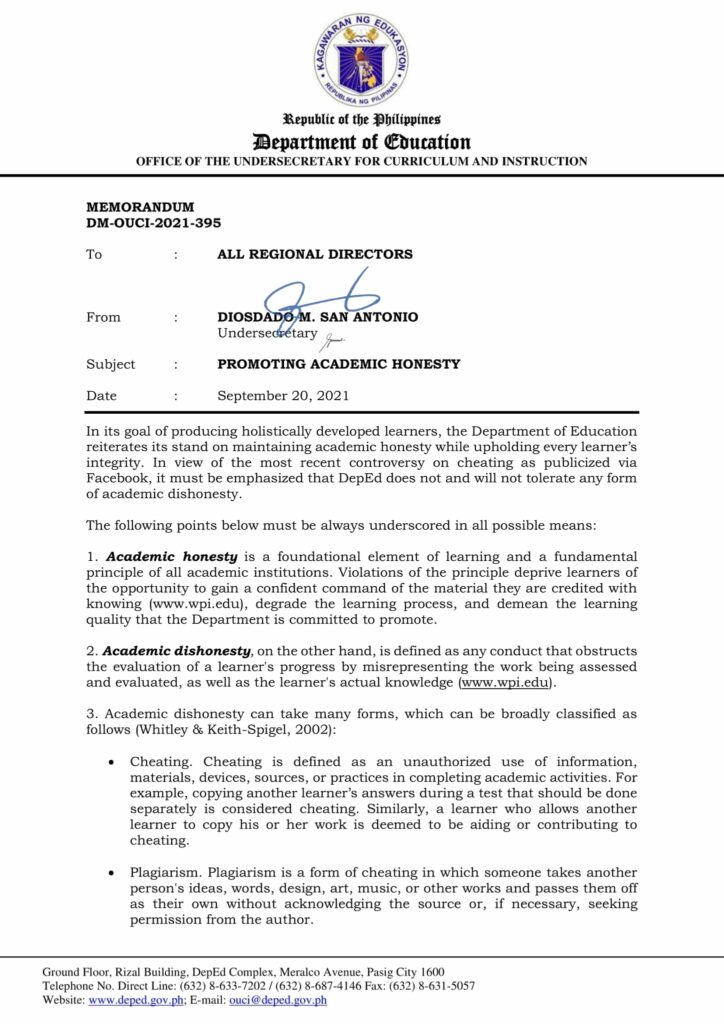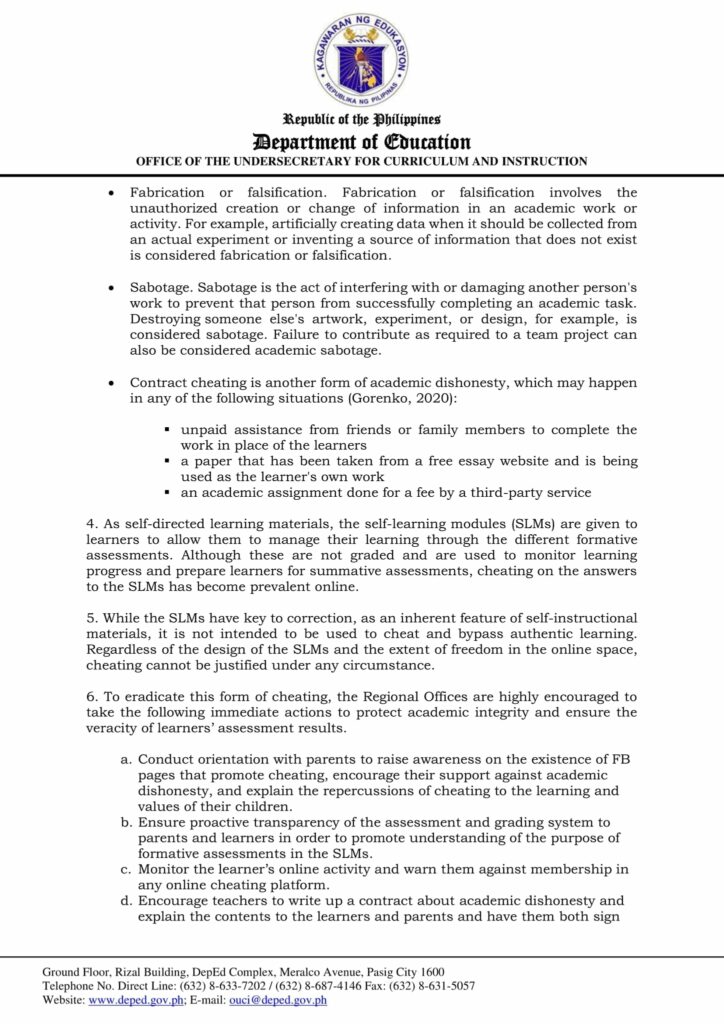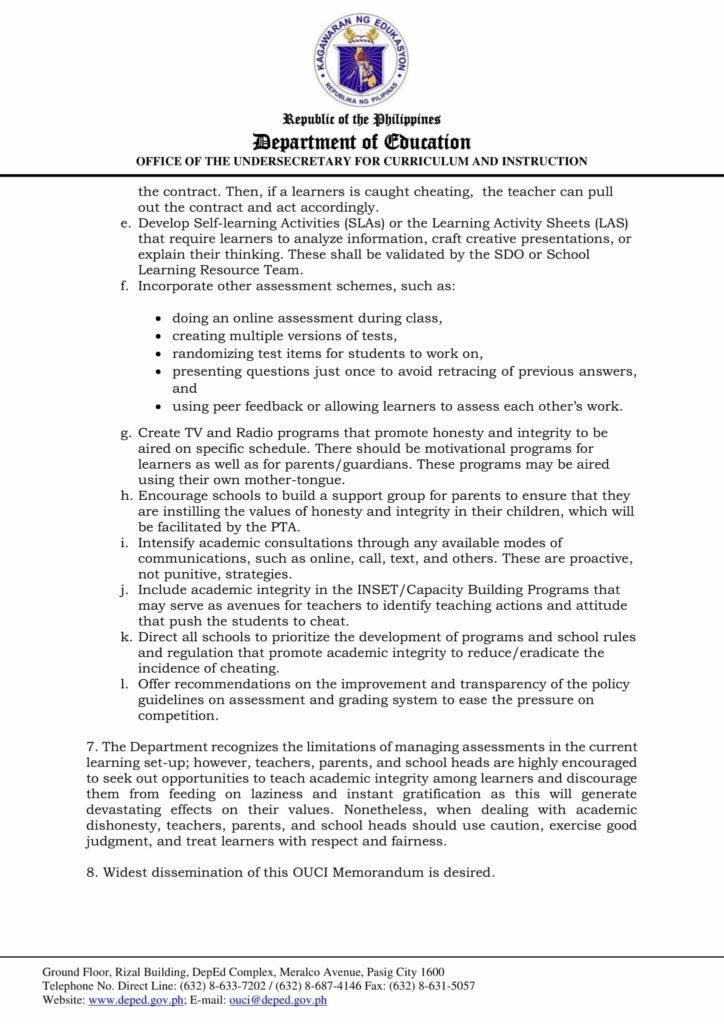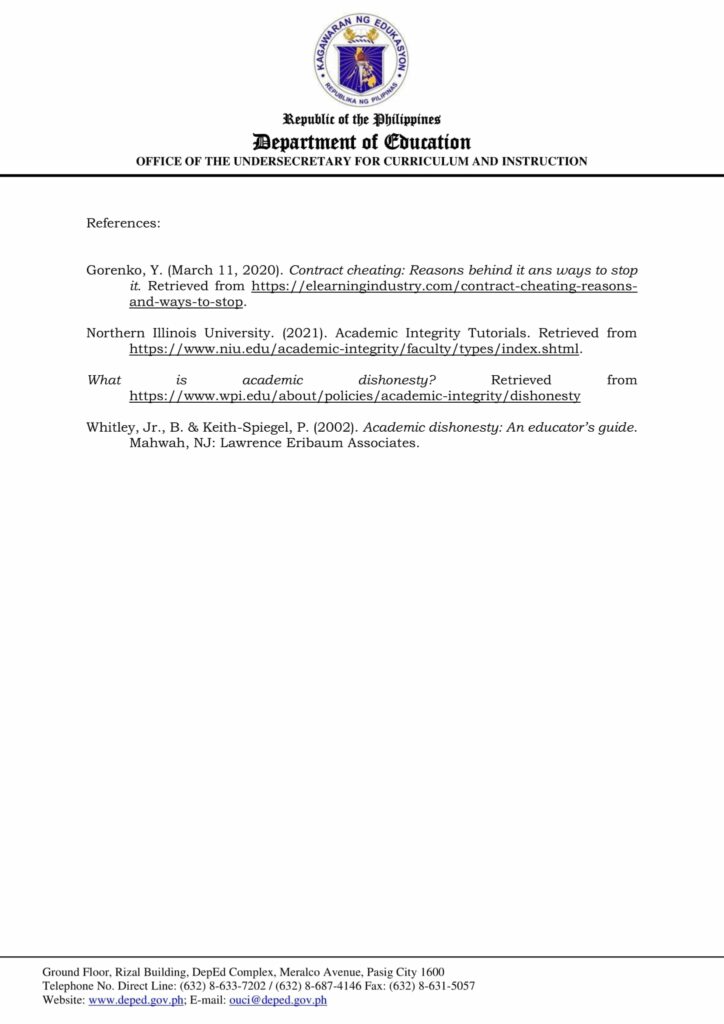Attached herewith is DepEd Memorandum DM-OUCI-2021-395 dated September 20, 2021, from the Office of the Undersecretary for Curriculum and Instruction on Promoting Academic Honesty.
Promoting Academic Honesty
In its goal of producing holistically developed learners, the Department of Education reiterates its stand on maintaining academic honesty while upholding every learner’s integrity. In view of the most recent controversy on cheating as publicized via Facebook, it must be emphasized that DepEd does not and will not tolerate any form of academic dishonesty.
The following points below must be always underscored in all possible means:
1. Academic honesty is a foundational element of learning and a fundamental principle of all academic institutions. Violations of the principle deprive learners of the opportunity to gain a confident command of the material they are credited with knowing (www.wpi.edu), degrade the learning process, and demean the learning quality that the Department is committed to promote.
2. Academic dishonesty, on the other hand, is defined as any conduct that obstructs the evaluation of a learner’s progress by misrepresenting the work being assessed and evaluated, as well as the learner’s actual knowledge (www.wpi.edu).
3. Academic dishonesty can take many forms, which can be broadly classified as follows (Whitley & Keith-Spigel, 2002):
- Cheating. Cheating is defined as an unauthorized use of information, materials, devices, sources, or practices in completing academic activities. For example, copying another learner’s answers during a test that should be done separately is considered cheating. Similarly, a learner who allows another learner to copy his or her work is deemed to be aiding or contributing to cheating.
- Plagiarism. Plagiarism is a form of cheating in which someone takes another person’s ideas, words, design, art, music, or other works and passes them off as their own without acknowledging the source or, if necessary, seeking permission from the author.
- Fabrication or falsification. Fabrication or falsification involves the unauthorized creation or change of information in an academic work or activity. For example, artificially creating data when it should be collected from an actual experiment or inventing a source of information that does not exist is considered fabrication or falsification.
- Sabotage. Sabotage is the act of interfering with or damaging another person’s work to prevent that person from successfully completing an academic task. Destroying someone else’s artwork, experiment, or design, for example, is considered sabotage. Failure to contribute as required to a team project can also be considered academic sabotage.
- Contract cheating is another form of academic dishonesty, which may happen in any of the following situations (Gorenko, 2020):
- unpaid assistance from friends or family members to complete the work in place of the learners
- a paper that has been taken from a free essay website and is being used as the learner’s own work
- an academic assignment done for a fee by a third-party service
4. As self-directed learning materials, the self-learning modules (SLMs) are given to learners to allow them to manage their learning through the different formative assessments. Although these are not graded and are used to monitor learning progress and prepare learners for summative assessments, cheating on the answers to the SLMs has become prevalent online.
5. While the SLMs have key to correction, as an inherent feature of self-instructional materials, it is not intended to be used to cheat and bypass authentic learning. Regardless of the design of the SLMs and the extent of freedom in the online space, cheating cannot be justified under any circumstance.
6. To eradicate this form of cheating, the Regional Offices are highly encouraged to take the following immediate actions to protect academic integrity and ensure the veracity of learners’ assessment results.
a. Conduct orientation with parents to raise awareness on the existence of FB pages that promote cheating, encourage their support against academic dishonesty, and explain the repercussions of cheating to the learning and values of their children.
b. Ensure proactive transparency of the assessment and grading system to parents and learners in order to promote understanding of the purpose of formative assessments in the SLMs.
c. Monitor the learner’s online activity and warn them against membership in any online cheating platform.
d. Encourage teachers to write up a contract about academic dishonesty and explain the contents to the learners and parents and have them both sign the contract. Then, if a learners is caught cheating, the teacher can pull out the contract and act accordingly.
e. Develop Self-learning Activities (SLAs) or the Learning Activity Sheets (LAS) that require learners to analyze information, craft creative presentations, or explain their thinking. These shall be validated by the SDO or School Learning Resource Team.
f. Incorporate other assessment schemes, such as:
- doing an online assessment during class,
- creating multiple versions of tests,
- randomizing test items for students to work on,
- presenting questions just once to avoid retracing of previous answers, and
- using peer feedback or allowing learners to assess each other’s work.
g. Create TV and Radio programs that promote honesty and integrity to be aired on specific schedule. There should be motivational programs for learners as well as for parents/guardians. These programs may be aired using their own mother-tongue.
h. Encourage schools to build a support group for parents to ensure that they are instilling the values of honesty and integrity in their children, which will be facilitated by the PTA.
i. Intensify academic consultations through any available modes of communications, such as online, call, text, and others. These are proactive, not punitive, strategies.
j. Include academic integrity in the INSET/Capacity Building Programs that may serve as avenues for teachers to identify teaching actions and attitude that push the students to cheat.
k. Direct all schools to prioritize the development of programs and school rules and regulation that promote academic integrity to reduce/eradicate the incidence of cheating.
l. Offer recommendations on the improvement and transparency of the policy guidelines on assessment and grading system to ease the pressure on competition.
7. The Department recognizes the limitations of managing assessments in the current learning set-up; however, teachers, parents, and school heads are highly encouraged to seek out opportunities to teach academic integrity among learners and discourage them from feeding on laziness and instant gratification as this will generate devastating effects on their values. Nonetheless, when dealing with academic dishonesty, teachers, parents, and school heads should use caution, exercise good judgment, and treat learners with respect and fairness.
8. Widest dissemination of this OUCI Memorandum is desired.
References:
Gorenko, Y. (March 11, 2020). Contract cheating: Reasons behind it and ways to stop it. Retrieved from https://elearningindustry.com/contract-cheating-reasons-and-ways-to-stop.
Northern Illinois University. (2021). Academic Integrity Tutorials. Retrieved from https://www.niu.edu/academic-integritv/facultv/types/index.shtml.
What is academic dishonesty? Retrieved from https://www.wpi.edu/about/policies/academic-integritv/dishonesty
Whitley, Jr., B. & Keith-Spiegel, P. (2002). Academic dishonesty: An educator’s guide. Mahwah, NJ: Lawrence Eribaum Associates.



